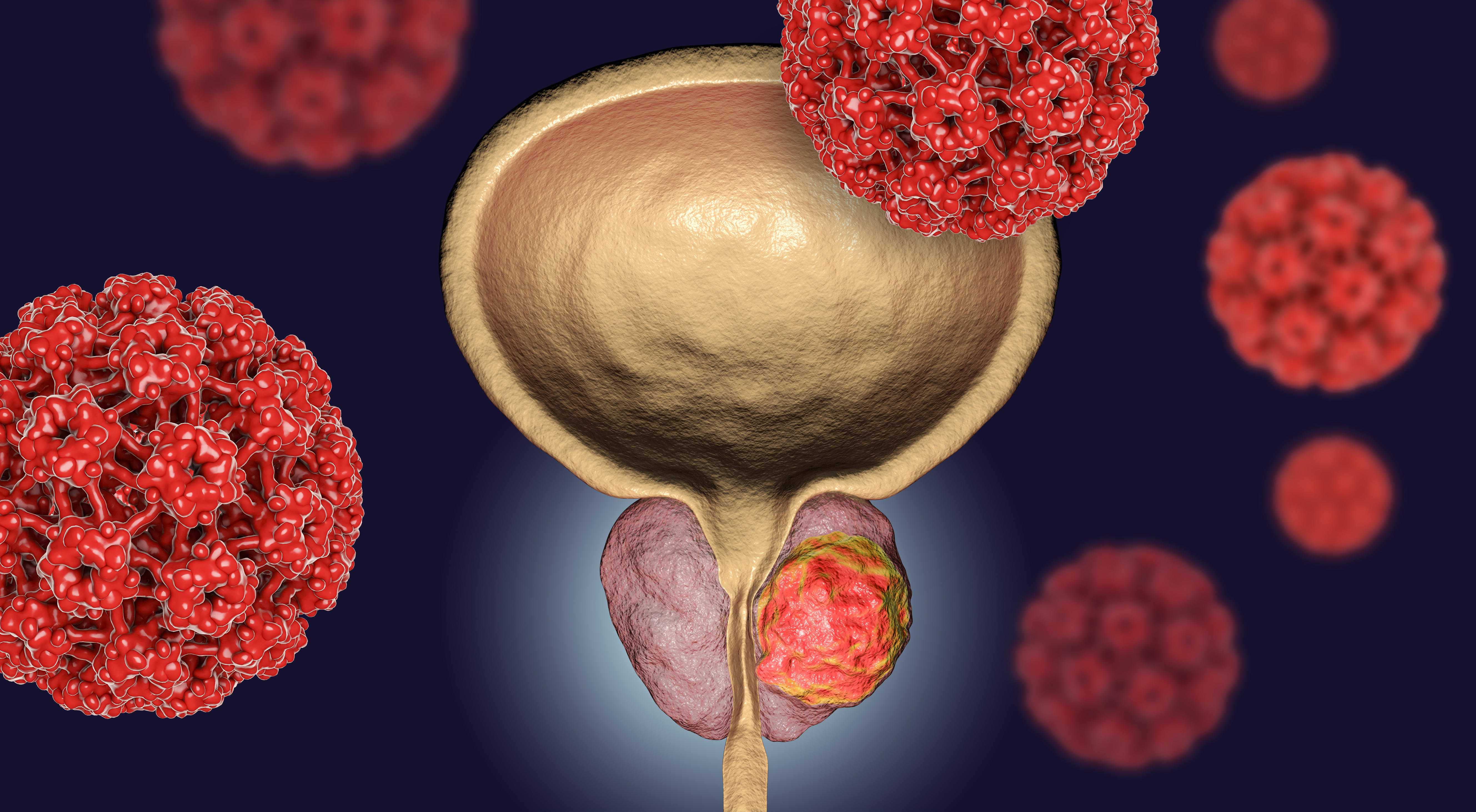Enfortumab Vedotin Plus Pembrolizumab Improves Outcomes vs Chemo in Urothelial Cancer
Patients with locally advanced or metastatic urothelial cancer treated with enfortumab vedotin plus pembrolizumab experienced a reduction in the risk for disease progression or death vs chemotherapy.
Enfortumab Vedotin Plus Pembrolizumab Improves Outcomes vs Chemo in Urothelial Cancer

Patients with previously untreated locally advanced or metastatic urothelial carcinoma treated with enfortumab vedotin-ejfv (Padcev) plus pembrolizumab (Keytruda) experienced significant improvements in outcomes compared with chemotherapy, according to updated findings from the phase 3 EV-302/KEYNOTE-A39 trial (NCT04223856) published in The New England Journal of Medicine.1
The median progression-free survival (PFS) was 12.5 months (95% CI, 10.4-16.6) with the enfortumab vedotin combination and 6.3 months (95% CI, 6.2-6.5) with chemotherapy (HR, 0.45; 95% CI, 0.38-0.54; P <.001). Additionally, PFS outcomes were comparable across all prespecified subgroups, including those based on cisplatin eligibility status and PD-L1 expression status.
The median overall survival (OS) was 31.5 months (95% CI, 25.4-not reached [NR]) vs 16.1 months (95% CI, 13.9-18.3) with enfortumab vedotin plus pembrolizumab and chemotherapy, respectively (HR, 0.47; 95% CI, 0.38-0.58; two-sided P <.001). The estimated 12-month OS rate was 78.2% (95% CI, 73.9%-81.9%) vs 61.4% (95% CI, 56.6%-65.9%) in each respective treatment arm. OS results in the intent-to-treat (ITT) population were similar to those observed across prespecified subgroups.
Findings highlighted a confirmed overall response rate (ORR) of 67.7% (95% CI, 63.1%-72.1%) in the enfortumab vedotin arm vs 44.4% (95% CI, 39.7%-49.2%) in the chemotherapy arm (P <.001). Additionally, 29.1% (n = 127/437) and 12.5% (n = 55/451) of patients from each respective arm had a complete response (CR). The median duration of response (DOR) was NR and 7.0 months in each arm, with ongoing responses observed in 67.3% vs 35.2% at 12 months and 59.6% vs 19.3% at 18 months.
“The EV-302 trial showed a significant and clinically meaningful benefit of enfortumab vedotin and pembrolizumab over chemotherapy with respect to [PFS] and [OS] in patients with previously untreated locally advanced or metastatic urothelial carcinoma,” Thomas Powles, a professor of urology cancer at the University of London and the director of Barts Cancer Centre in the United Kingdom, and coauthors wrote in the publication.
In December 2023, the FDA approved the combination of enfortumab vedotin plus pembrolizumab for use in this patient population based on the phase 3 EV-302 findings.2
In the international, open-label phase 3 EV-302 trial, 886 patients were assigned 1:1 to receive 3-week cycles of enfortumab vedotin at 1.25 mg/kg intravenously on days 1 and 8 plus pembrolizumab at 200 mg intravenously on day 1 (n = 442) or chemotherapy with gemcitabine at 1000 mg/m2 intravenously plus cisplatin at 70 mg/m2 intravenously or carboplatin at area under the curve of 4.5 to 5 mg/mL/minute (n = 444).
The trial’s primary end points were PFS per RECIST v1.1 criteria and OS. Secondary end points included ORR, DOR, time to pain progression, and safety.
Adult patients with radiologically documented and histologically confirmed unresectable locally advanced or metastatic urothelial carcinoma were eligible for enrollment on the trial. Those with adenocarcinoma or squamous cell differentiation histology were able to enroll.
In the enfortumab vedotin and chemotherapy arms, respectively, most patients were male (77.8% vs 75.7%), White (69.7% vs 65.3%), from Europe (38.9% vs 44.4%), and had an ECOG performance status of 0 (50.5% vs 48.4%). Additionally, most patients had metastatic disease (95.2% vs 94.6%), urothelial carcinoma histology (85.7% vs 84.0%), visceral site metastases (71.9% vs 71.6%), eligibility to receive cisplatin (54.3% vs 54.5%), and high PD-L1 expression (58.0% vs 57.9%).
Investigators reported a median time to pain progression of 14.2 months with the enfortumab vedotin combination and 10.0 months with chemotherapy (HR, 0.92; 0.72-1.17; P = .48). Because the between-group difference for this outcome lacked statistical significance, investigators did not formally test additional patient-reported outcomes in the statistical hierarchy. Additionally, 32.6% patients from the enfortumab vedotin arm remained on study treatment as of the data cutoff; no patients in the chemotherapy arm were continuing to receive treatment.
Any-grade treatment-related adverse effects (TRAEs) affected 97.0% of those who received enfortumab vedotin plus pembrolizumab and 95.6% of those who were treated with chemotherapy. Common any-grade TRAEs in the enfortumab vedotin arm included peripheral sensory neuropathy (50.0%), pruritus (39.8%), and alopecia (33.2%). Grade 3 or higher TRAEs were highlighted in 55.9% of those in the enfortumab vedotin arm and 69.5% of those who received chemotherapy. Grade 3 or higher TRAEs in the enfortumab vedotin arm included maculopapular rash (7.7%), hyperglycemia (5.0%), and neutropenia (4.8%).
In the enfortumab vedotin and chemotherapy arms, respectively, 40.7% and 37.9% of patients had TRAEs leading to dose reductions. Four patients in the enfortumab vedotin arm experienced TRAEs that resulted in death, which included multiple organ dysfunction syndrome, immune-mediated lung disease, diarrhea, and asthenia in 1 patient each.
References
- Powles T, Valderrama BP, Gupta S, et al. Enfortumab vedotin and pembrolizumab in untreated advanced urothelial cancer. N Engl J Med. 2024;390(10):875-888. doi:10.1056/NEJMoa2312117.
- FDA approves enfortumab vedotin-ejfv with pembrolizumab for locally advanced or metastatic urothelial cancer. News release. FDA. December 15, 2023. Accessed April 2, 2024. https://bit.ly/48ls9bi
Key Advances in Cancer Survivorship Toxicity Management
July 15th 2022In this episode of The Vitals, Lidia Schapira, MD, FASCO, recounts highlights from the 2022 ASCO Symptoms and Survivorship track and underscores key takeaways for practitioners seeking to enhance the delivery of cancer survivorship care.


